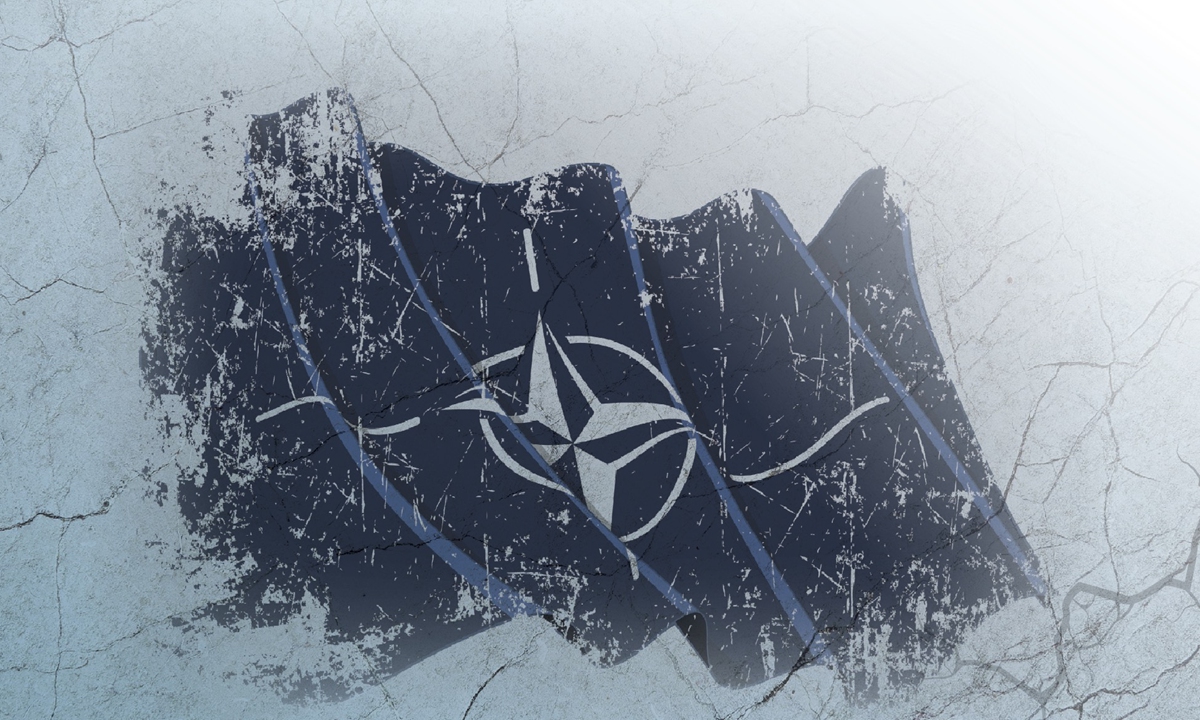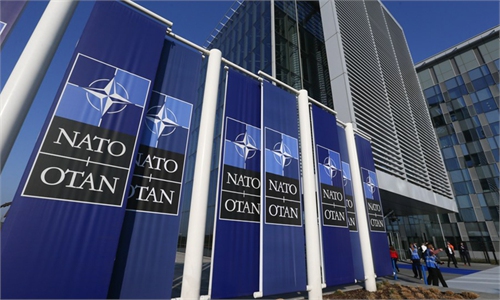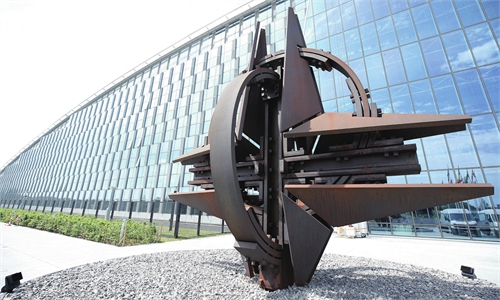
Photo:VCG
Editor's Note:
April 4, 2024, marks the 75th anniversary of the founding of NATO. As a product of the Cold War, NATO should have been disbanded, but over the years, it has served as a war machine and facilitated US hegemony. The Global Times talked to a number of experts and scholars to reveal how the US exploits NATO to serve its geopolitical purposes and how NATO destabilizes the world, exacerbates nuclear threats and brings confrontation to Asia.
In the second interview of the series, Global Times (GT) reporter Li Aixin talked to John Pang (Pang), a former Malaysian government official and a senior research fellow at Perak Academy, Malaysia. John said that having set Europe on fire with its aggressive enlargement, NATO proposes to bring their formula to Asia, against a far more powerful opponent - "It's an imbecile proposition."
GT: Western politicians like to say that NATO is "stronger than ever." How would you describe the 75-year-old NATO?
Pang: I think NATO sounds more threatening and incoherent than ever. If that's what they mean by "strong," I guess they're right in that respect. But it is also showing real signs of impending demise.
It is well past its shelf date. It was formed in the 1940s in response to the Soviet bloc, before the Warsaw Pact. The Warsaw Pact was created as a defense treaty against NATO. With the dissolution of the Soviet Union and the Warsaw Pact, NATO should have disbanded too. Instead it took on a new, expansionary role in securing US global supremacy. It is an aggressive, overextended organization adrift from its founding aims and attached now to the fantastical aim of "making the world safe for democracy," that is to say, to attacking whoever the US deems the enemy of the day.
Devoid of its charter purpose, it's been an organization in search of enemies and increased defense procurement. It's made Russia, once again, the enemy. It has overextended itself on this venture in a way that has blighted Europe's future and threatens its own survival. It now frames China, on the other side of the planet, as the security challenge. That's where it is after 75 years.
GT: US Secretary of State Antony Blinken said that the NATO summit, to be held in July, will be "the most ambitious summit since the end of the Cold War, showing NATO's adaptation to new challenges and new threats, whether it's Russia, whether it's in very different ways the PRC." What's your take on this claim?
Pang: China does not pose a threat to the US, nor does Russia. Unlike the West, China has risen in peace. It is now the world's trade and manufacturing hub, the largest trading partner to a majority of the world's nations. Its pattern of socialist development has been peaceful and based on mutually beneficial relations. No country contributes more to the global commons. It is helping build global infrastructure connectivity as a basis of growth. It is pioneering the energy transition. It has opened avenues for the development of the rest of the Global South that were shut under the Western neocolonial order promoted by NATO. The hard work and sacrifice of the Chinese people has kept living costs affordable for the Western working class over the last thirty years despite the increasing inequality generated by their winner-take-all economies. China is not a threat. To the contrary, it plays a vital role in regional and global prosperity and stability. NATO is adapting itself to threaten peace and stability in East Asia.
The "ambition" Blinken describes is for an expansive, virtualized NATO, reinvented for encircling a fabricated threat. It is a NATO as a pure extension of US imperial policy. There's not even the pretense of an independent European interest left in it.
GT: The US is strengthening military ties with Japan and South Korea, as well as promoting AUKUS, Quad, supporting the Philippines. Meanwhile, on the whole, US-led NATO countries are engaging in increasingly frequent military activities in the Asia-Pacific region. Is NATO building their strategic pivot in the region?
Pang: It is neither strategic nor a pivot. I don't think it rises to the level of strategy, which needs to define a purpose and a mandate clearer than "making the world safe for democracy." There's a limit to how much threat you can manufacture, how woolly (Secretary Blinken would say, "ambitious") your aspirations can be, before they become incoherent.
Europe doesn't need to be defended from a vibrant, peaceful China peacefully integrated into the global economy and its home region. Europe needs to grow its trade and investment relationships and profit from the dynamism of East Asia, not show up, waving NATO's flag as a tin pot colonial adjutant.
I also wouldn't dignify NATO's move with the word "pivot." It is simply inflating itself to do what it is not designed to do, go where it has no business to be. This is part of the hollowing out of any meaning to NATO. It was a Cold War enterprise. After 1991, turning its back on any "peace dividend" from the end of the Cold War, it reinvented itself as the enforcer of unipolar order with the bombing of Serbia. It has since prosecuted wars of aggression in Afghanistan and Libya. Tuning its own enlargement into a sacred principle, it has expanded to the borders of Russia, where it is engaged in a proxy war with a nuclear superpower.
Using the term "strategic pivot" is really part of a crazy need for expansionism. This is not a pivot, it's the out-of-control inflation of its mandate to the point of irrealism. It's Europe's brutal colonialism in Asia returned as a Eurovision song and dance entry. We await the return of the British and Dutch navies to menace regional waters again. Let's also bring back the Spanish and Portuguese galleons.
GT: Reports say that the US government is making arrangements for trilateral talks with the leaders of Japan and South Korea in July at the NATO summit in Washington. What do you think that means?
Pang: President Biden held a summit with Prime Minister Kishida and President Yoon in Camp David last year at which they signed a trilateral pact (JAROKUS). Kishida and Yoon have been attending NATO summits since 2022. Their proposed meeting with Biden in a trilateral format on the sidelines of this year's NATO summit would begin to regularize JAROKUS as an annex of NATO and further globalize NATO.
This will complete the consolidation of the worldwide set of US vassals, outposts and 800 military bases under NATO, Quad, AUKUS and this trilateral pact into a streamlined global threat posture also known as the West. There have even been moves to make Israel part of a Quad Plus, along with New Zealand.
Meanwhile, we have Europe as an example of what "Natofied' Japan and South Korea can look forward to: further loss vassalization not just in foreign policy but also in trade and industrial policy, technology, media and, crucially, culture, since post 1991 NATO is motivated by an expansionary liberalism that thrives on the destruction of cultural boundaries as much as national borders.
GT: What do you think of the prospect of "NATO's Asia-Pacificization" or the establishment of an "Asian NATO"?
Pang: This is another one of those announcements that will go down in history like President Joe Biden's Build Back Better World, the Indo-Pacific Economic Framework for Prosperity, and other grand ideas for bifurcating the world that lead nowhere.
The biggest of them is, of course, the Rules-Based Order, whose moral, legal and political legitimacy is now absolutely collapsed. It will go down in history identified with its signature achievement, the genocidal destruction of Gaza.
Its purpose is to threaten, but it's also empty. What is NATO anymore, as an aggressive pact, far from Europe? What is the military capability of this set of countries beyond the US? What is brought to the existing issues in East Asia, around the South China Sea, for example, by having this set of 32 nations participate, who are collectively outclassed by Russian military industrial capability in Ukraine? Having set Europe on fire with its aggressive enlargement, they propose to bring their formula to Asia, against a far more powerful opponent. It's an imbecile proposition.
Wherever possible, Asian NATO should be ignored or bypassed by the countries in the region. Their presence in the region would be so incoherent that it's not clear what there is to engage with. NATO is a treaty organization for the North Atlantic, a noticeable distance away. They are militarily irrelevant here. We get the spectacle of the German and Dutch navies sailing into the region to sabre-rattle, and have symbolic exercises with the Japanese, for example, and perhaps next with the Philippines.
This entertains the Western elite for a couple days with an appearance of a grand alliance of the "democracies" against China, at a time when, as their citizens will tell you, actual democracy has been hollowed out by oligarchic rule at home. They aim to encircle and divide but have nothing to encircle or divide with. They will add nothing but a layer of live action Euro role playing on top of the existing, and material, US threat posture.
Instead, NATO in Asia is really about what the US and its military industrial complex will do to its own members. In its expanded form, it will tighten the US' extractive grip on Europe and Japan and South Korea more than it threatens China. It will mandate purchases of US military equipment and more money from member states, especially that standby piggy bank, Japan. It will de-industrialize Japan as it has Germany, in favor of the US. It will demand more political and cultural conformity, further militarize Japan and South Korea, and alienate them from the economic and cultural vitality of their home region.
Europe, Japan and South Korea can say goodbye to any notion of strategic, political, economic or cultural autonomy. Remember that this is happening while actual freedom is breaking out among sovereign nations in the multipolar world of an expanding BRICS.
GT: When they are doing this, how does ASEAN feel about NATO?
Pang: I don't, of course, represent ASEAN. But I have worked with and in ASEAN, both the formal organization, and ASEAN type organizations, long enough to understand the thinking, the culture, the aspirations, the perspectives and the values of ASEAN.
This is a completely undesirable development for ASEAN, just as AUKUS is. To bring the European powers back into the region, even just to wave pretty flags at sea, would leave a very bad taste in the mouth. Southeast Asia is a region with far greater, far better prospects than Europe. It's a much more vibrant, much more economically promising region than Europe. Former colonial masters have no business returning to the region with their old games. They'd be lost and out of place here.
It goes against everything that ASEAN stands for, which is a zone of peace and neutrality and non-alignment. NATO is the exact model of everything that ASEAN despises in the way inter-state relations can be organized. It is a throwback to the world of European Great Power competition and imperialism that once enslaved our entire region. NATO is the sordid past. It is antithetical to the future that we envision in a multipolar world, built not on military alliances but on associations and regionalisms that are open to all and based on peaceful win-win cooperation.


